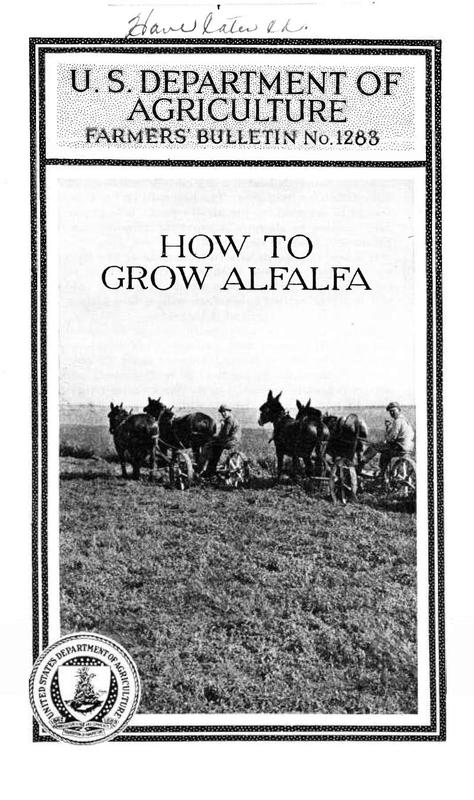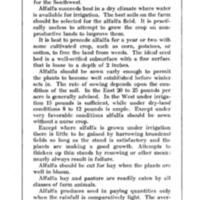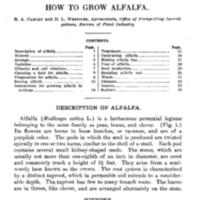How to Grow Alfalfa
Date
1922
Excerpt
ALFALFA is a perennial legume belonging to the same family as peas, beans, and clover. The leading commercial varieties of alfalfa in the United States are the Common, Grimm, Turkestan, and Peruvian. Grimm alfalfa is superior to the Common in the North, and Peruvian is preferable for the Southwest.
Alfalfa succeeds best in a dry climate where water is available for irrigation. The best soils on the farm should be selected for the alfalfa field. It is practically useless to attempt to grow the crop on non-productive lands to improve them.
It is best to precede alfalfa for a year or two with some cultivated crop, such as corn, potatoes, or cotton, to free the land from weeds. The ideal seed bed is a well-settled subsurface with a fine surface that is loose to a depth of 2 inches.
Alfalfa should be sown early enough to permit the plants to become well established before winter sets in. The rate of sowing depends upon the condition of the soil. In the East 20 to 25 pounds per acre is generally advised. In the West under irrigation 15 pounds is sufficient, while under dry-land conditions 8 to 12 pounds is ample. Except under very favorable conditions alfalfa should be sown without a nurse crop.
Except where alfalfa is grown under irrigation there is little to be gained by harrowing broadcast fields so long as the stand is satisfactory and the plants are making a good growth. Attempts to thicken up thin stands by resowing or other means nearly always result in failure.
Alfalfa should be cut for hay when the plants are well in bloom.
Alfalfa hay and pasture are readily eaten by all classes of farm animals.
Alfalfa produces seed in paying quantities only when the rainfall is comparatively light. The average yield per acre runs from 2 to 5 bushels.
Alfalfa succeeds best in a dry climate where water is available for irrigation. The best soils on the farm should be selected for the alfalfa field. It is practically useless to attempt to grow the crop on non-productive lands to improve them.
It is best to precede alfalfa for a year or two with some cultivated crop, such as corn, potatoes, or cotton, to free the land from weeds. The ideal seed bed is a well-settled subsurface with a fine surface that is loose to a depth of 2 inches.
Alfalfa should be sown early enough to permit the plants to become well established before winter sets in. The rate of sowing depends upon the condition of the soil. In the East 20 to 25 pounds per acre is generally advised. In the West under irrigation 15 pounds is sufficient, while under dry-land conditions 8 to 12 pounds is ample. Except under very favorable conditions alfalfa should be sown without a nurse crop.
Except where alfalfa is grown under irrigation there is little to be gained by harrowing broadcast fields so long as the stand is satisfactory and the plants are making a good growth. Attempts to thicken up thin stands by resowing or other means nearly always result in failure.
Alfalfa should be cut for hay when the plants are well in bloom.
Alfalfa hay and pasture are readily eaten by all classes of farm animals.
Alfalfa produces seed in paying quantities only when the rainfall is comparatively light. The average yield per acre runs from 2 to 5 bushels.
Title
How to Grow Alfalfa
File(s)
How to Grow Alfalfa Cover.jpg
(image/jpeg)
How to Grow Alfalfa Summary.jpg
(image/jpeg)
How to Grow Alfalfa TOC.jpg
(image/jpeg)
 An official website of the United States government.
An official website of the United States government.




